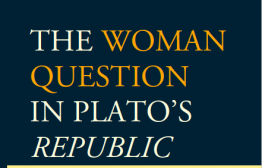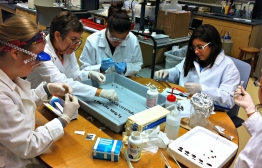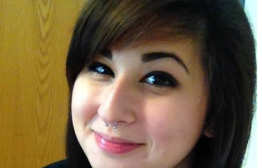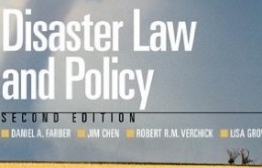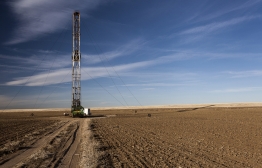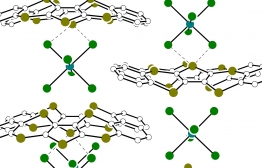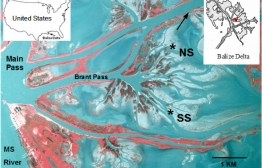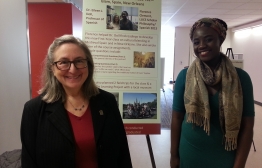As a Loyola student, you have the opportunity to work alongside our talented professors to partner in collaborative research. Learn more about some recent research and projects currently underway.
The Woman Question in Plato's Republic
Dr. Mary Townsend's book The Woman Question in Plato's Republic was published by Lexington Books (Lanham, MD), August 2017.
Epidemiology and Control of Chagas Disease
Dr. Patricia Dorn and a team of undergraduate researchers focus on interrupting transmission of Chagas disease, a leading cause of heart disease in Latin America, caused by the parasite Trypanosoma cruzi, and transmitted by kissing bugs. Through investigating the kissing bugs, they improve control methods and prevent people from becoming infected with this deadly parasite.
Chagas disease is contracted when infected kissing bugs bite humans or animals, opening a wound and producing contaminated waste that enters the wound or mucous membranes and ultimately into the bloodstream. Dorn says reactions to the bite itself can range from slight to extremely severe allergic reactions called anaphylaxis.
Once it enters the bloodstream, the Chagas parasite attacks muscle tissue, especially the heart, and may not be detected for 10 to 20 years. By that time, Dorn says the damage is done and the treatment options are limited.
Dorn and her student researchers have traveled to Guatemala to hunt for the kissing bugs in homes, caves and other locations in order to conduct the groundbreaking research. They've also spent time in Latin America creating educational films to educate villagers with step-by-step instructions for implementing an ecohealth approach to stopping the transmission of the deadly tropical disease. In Latin America, 7 to 8 million people are infected with the Chagas parasite and 30 to 40 percent of those are doomed to life-threatening heart disease.
Recent reserach conducted by the team shows people in the Southwestern U.S. are encountering the “Kissing bugs” that harbor the parasite that causes Chagas disease.
Although the bugs don’t infect humans at the same rate as they do in Latin America, the free-roaming kissing bugs in the desert Southwest frequently feed on humans outside the confines of their homes. For example, in a recent test eight bugs tested had all fed on humans and three of these were also infected with the Chagas-causing parasite Dorn and her team study—something the scientists can tell by looking at the DNA in the bugs’ abdomens. Because some of the bugs harbor the deadly parasite, this could represent an unrecognized potential for transmission of Chagas disease in the U.S.
Virtual Reality Research
Dr. Dupuis conducts research examining the effects of gaming and virtual reality on social behaviors including interpersonal violence and attitudes toward women. Her students have used virtual reality to examine concepts such as street harassment, sexism, embodiment, and aggression.
Student and faculty member collaborate on scholarly review
Philosophy senior Tara Malay and faculty member Dr. Leonard Kahn co-authored a review of Carol C. Gould's Interactive Democracy: The Social Roots of Global Justice for the journal Philosophy in Review. This project was sponsored by the Loyola University Collaborative Scholarship program. You can read the review here.
Malay begins graduate work in linguistics at the University of Jyväskylä in Finland this fall (2016).
Synthetic Organic Chemistry
Dr. Stephenson focuses on the synthesis of sensors based on supermolecular interactions, utilizing synthetic organic chemistry to form useful new materials; in other words, his main interest is in studying the interaction of molecules in order to make biocompatible sensing materials. Specifically, Dr. Stephenson's projects work to synthesize and study new sensors based on xanthene dyes such as rhodamine B. The sensors are formed by modifying existing dyes to have specific functions.
Robert Verchick's Recent Publications and Presentations on Environmental Law
This year (2015-16) Robert Verchick a faculty member in the Environment Program has written and published a variety of works on Environmental Law. Robert has also spoke on many important environmental topics here in the US and internationally. See more detailed information below:
Books
Disaster Law and Policy (WoltersKluwer/Aspen 3d ed. 2015) (with Daniel A. Farber, Jim Chen, & Lisa Grow Sun)
Feminist Legal Theory (NYU Press 2d ed. 2016) (with Nancy Levit and foreword by Martha Minow)
Book Chapters
"Environmental Law", in Cuban Legal System, (Thomas Reuters Publishing, José Cot & Rolando Anillo eds., 2016) (in press)
"Disaster Law and Climate Change", in Climate Change Law, (Edward Elgar Publishing, Daniel A. Farber & Marjan Peeters eds., 2016)
"Natural Disaster and Climate Change", in International Environmental Law and the Global South: Comparative Perspectives, 491-507 (Shawkat Alam, Sumudu Atapattu, Carmen G.Gonzalez, & Jona Razzaque eds., Cambridge University Press 2015) (with Paul Govind)
Law Review Article
"Culture, Cognition, & Climate," 2016 University of Illinois Law Review -- (in press)
Policy Papers
"Climate Change, Resilience, and Fairness: How Nonstructural Adaptation Can Protect and Empower Socially Vulnerable Communities on the Gulf Coast" (Center for Progressive Reform 2016) (with Carmen Gonzalez, et al.)
Op-Eds
"Time for Communities to Face Climate Change," Advocate (New Orleans), Apr. 14, 2016
"VW and GM Scandals Show Why Regulation Matters," The Hill (Washington, D.C.), Sept. 30, 2015 (with Rena Steinzor)
"Katrina’s Lessons: Learned and Unlearned," Houston Chronicle, Aug. 28, 2015
Presentations
Oxford University, All Soul’s College (Oxford, U.K.), Workshop: Regulating the Energy
Transition; presented "Lights Out: Energy, Resilience, & Fairness" (June 2016)
Law and Society Association Annual Meeting, panel; presented "Lights Out: Energy,
Resilience, and Fairness" (May 2016)
Law and Society Association Annual Meeting, panel; presented "Bridge Under Troubled
Water: Climate Resilience and Fairness" (May 2016)
Law and Society Association Annual Meeting, panel, “The Coming Era of Gender Inequality”
(May 2016)
University of Kansas (Lawrence, KS), Symposium, "Justice in the Low-Carbon Transition,"
panelist (April 2016)
Loyola University New Orleans, Conference on Coastal Resilience (co-sponsored with
Oxfam America), Moderator, "Non-Structural Tools for Adaptation" (April 2016)
State of the Coast Conference (New Orleans, LA); presentation: “Climate Change, Resilience,
and Fairness” (April 2016)
Loyola University New Orleans (New Orleans, LA), Conference: Beyond the Levees
(sponsored by Loyola Center for Environmental Law, Oxfam America, and Center for
Progressive Reform); presentation: “Climate Change, Resilience, and Fairness” (April 2016)
University of Georgia (Athens, GA), Keynote Address at Red Clay Conference; presented
"Bridge Under Troubled Water: Climate Resilience and Transportation" (Feb. 2016)
Tulane University (New Orleans, LA), Environmental Law Summit, panelist; presented
"Culture, Cognition and Climate" (Feb. 2016)
Tulane University (New Orleans, LA), Environmental Law Summit, Moderator, "Waters of
the United States" (Feb. 2016)
University of Florida (Gainesville, FL), lecture "Climate and Coastal Retreat" (Jan. 2016)
University of Florida (Gainesville, FL), faculty colloquium "Culture, Cognition, and Climate"
(Jan. 2016)
Annual Meeting of Association of American Law Schools (New York, NY), panel,
“International Environmental Law and the North-South Divide: Crossroads of Economic,
Environmental, Human Rights, Energy, Food, Climate, and Sustainable Development Law”
(Jan. 2016)
Dr. Anthony Ladd's Recent and Forthcoming Publications and Presentations on Fracking
Professor Ladd’s research has yielded many publications and invitations to speak, which include:
Ladd, Anthony E. (ed). 2017. Fractured Communities: Risk, Impacts, and Protest Over Hydraulic Fracking in U.S. Shale Regions. New Brunswick, NJ: Rutgers University Press (forthcoming).
Ladd, Anthony E. 2017. “Motivational Frame Disputes Surrounding Natural Gas Fracking in the Haynesville Shale.” Forthcoming in Anthony E. Ladd (ed.), Fractured Communities: Risk, Impacts, and Protest Over Hydraulic Fracking in U.S. Shale Regions. Brunswick, NJ: Rutgers University Press.
Ladd, Anthony E. 2016. “Meet the New Boss, Same as the Old Boss: The Continuing Hegemony of Fossil Fuels and Hydraulic Fracking in the Third Carbon Era.” Humanity and Society 40: (doi: 10.1177/0165976166).
Ladd, Anthony E. Advisory Board, 2016-2019. “Hazards SEES: The Risk Landscape of Earthquakes Induced by Deep Wastewater Injection.” National Science Foundation Grant. Dr. Abbie Liel (PI) & Drs. Ann Sheehan and Liesel Ritchie (Co-PIs), Natural Hazards Center, University of Colorado, Boulder.
Ladd, Anthony E. Co-PI, 2016-2020. “Understanding the Social Impacts of Extreme Energy Extraction in the U.K.” Submitted to the Economic and Social Research Council, Drs. Michael Long & Paul Stretesky, (PIs), Dr. Duane A. Gill & Dr. Liesel A. Ritchie (Co-PIs). Grant proposal under review.
Anthony E. Ladd Organizer/Facilitator, “Fractured Landscapes: Wastewater Injection, Induced Seismicity, and Environment Injustice Surrounding Oil & Gas Fracking on the Western Plains.” Association for Humanist Sociology meetings, November 2-6, 2016, Denver, CO.
Anthony E. Ladd and Charles Perrow. “Institutional Dilemmas of Hydraulic Fracking: Economic Bonanza, Renewable Energy Bridge, or Gangplank to Disaster? American Sociological Association meetings, August 20-24, 2016, Seattle, WA.
Anthony E. Ladd Organizer/Facilitator, film screening of “Merchants of Doubt”; Organizer/Facilitator, “Emerging Issues in Environmental Sociology session, Association for Humanist Sociology meetings, October 21-25, 2015, Portland, OR.
Ladd, Anthony E. 2014. “Environmental Disputes and Opportunity-Threat Impacts Surrounding Natural Gas Fracking in Louisiana.” Social Currents 1(3): 209-228.
Ladd, Anthony E. 2013. “Stakeholder Perceptions of Socio-Environmental Impacts From Unconventional Natural Gas Development and Hydraulic Fracturing in the Haynesville Shale.” Journal of Rural Social Sciences 28(2): 56-89.
Anthony E. Ladd, “Meet the New Boss, Same as the Old Boss: Fossil Fuels, Fracking, and the Third Carbon Era.” Association for Humanist Sociology meeting, October 9-12, 2014, Cleveland, Ohio.
Anthony E. Ladd, “Unconventional Energy Development, Hydraulic Fracking, and The New Carbon Era:Ecological Modernization or Risk Society?” American Sociological Society meetings, August 16-19, 2014, San Francisco, CA.
Anthony E. Ladd, “Don’t Frack With Our Water: Stakeholder Perceptions of Negative Impacts Associated with Hydraulic Fracturing in the Haynesville Shale.” Association for Humanist Sociology meetings, October 9-13, 2013, Arlington, VA.
Anthony E. Ladd, “Frame Disputes and Opportunity-Threat Impacts Surrounding Hydraulic Fracturing in the Haynesville Shale.” American Sociological Association meetings, August 10-13, 2013, New York City.
Anthony E. Ladd, “Meet the Frackers: Framing Support for Hydraulic Fracturing in the Haynesville Shale Formation of Northwest Louisiana.” Midwest Sociological Society meetings, March 27-30, 2013, Chicago, IL.
Organic Superconductor Synthesis
Students working under Dr. Qin will have the opportunity to synthesize novel charge transfer complexes based on sulfur-rich, aromatic, heterocyclic molecules; students will then test these compounds as new organic conductors and superconductors that could help form the basis for superconducting power grids.
Nearly one-tenth of all electrical power is lost as it travels from the electric generators to the final consumers. A superconducting power grid would eliminate this wastage and have tremendous economic and environmental benefits. The best intermetallic superconductors have achieved Tc’s (the temperature at which superconductivity occurs) as high as 100 K, which allows them to operate at liquid nitrogen temperatures, but they are brittle, dense solids—a serious shortcoming for power cables. In contrast, organic materials tend to be lighter in weight and more pliable than inorganics, making them promising components of superconducting power grids.
Although inorganic chemists and physicists have dominated the field of superconductor discovery, superconductivity was first observed in organic molecules in the late 1980s. Despite this fact, this field is under explored, and there are very few classes of organic superconductors. Dr. Qin hopes to further the field and help solve the problem of energy waste.
Water Quality Change in the Mississippi River
Dr. David A. White and Dr. Jenneke M. Visser published an article "Water quality change in the Mississippi River, including a warming river, explains decades of wetland plant biomass change within its Balize delta." Aquatic Botany 132 (2016) 5-11.
Highlights
•Wetlands in the Mississippi River’s Balize Delta, USA showed an overall plant biomass increase with a large inter-annual change from 1988–2008.
•River discharge and sediment negatively impacted the biomass over these decades, whereas river temperature had a positive impact.
•The decadal plant biomass likely increased because of the impact of a 0.9 °C/decade increase in river temperature on growing season length.
•The added river temperature increased the growing season 0.7 days each year from 1983–2012, or 14.7 days over the shorter biomass study period.
•Climate change and land use/cover change in the catchment are likely responsible for the river and wetland biomass change in the Balize Delta.
Abstract
Ecosystem properties of riverine wetlands are known for high inter-annual variability. This multi-decadal study within the wetland complex of the Mississippi River’s Balize Delta, USA assesses how river parameters (temperature, discharge, and sediment load) impact wetland plant biomass over time and space. The Mississippi River’s annual temperature has increased 0.9 °C/decade, while discharge and sediment load has varied without trend over the same period. End-of-season herbaceous biomass increased 14 g/m2/year between 1988 and 2008, extrapolating to large (m-ton) area-wide increases. The river’s temperature, discharge and sediment impacted the Delta’s biomass in two ways: the increase in temperature had a positive impact on the growing season length which increased biomass; whereas discharge and load had negative impacts affecting the inter-annual variation without a temporal trend. The results explain natural variability in ecosystem processes in a dynamic deltaic system and likely trace a signal related to both climate warming and land use change within the drainage of the Mississippi River. The discovered decadal increase in herbaceous biomass has implications on carbon storage in the inshore and offshore receiving basins of the world’s riverine wetlands experiencing longer growing seasons.
First-Year Seminar on Cultural Blending
Islam, Spain, New Orleans
(This course is ONLY open to students who are enrolled into the Honors program)
Professor Eileen J. Doll, Department of Languages and Cultures
Disciplines: Literature, Medieval History
How does one culture influence another? Starting with the medieval history of Spain, when Islamic culture was at its peak in Europe, this course examines how Islamic culture affected the existing Christian and Jewish cultures of the Iberian Peninsula. We explore the cross-cultural history of 18th-century New Orleans, when it was part of the Spanish empire. Connecting to the present, we also investigate current immigration --legal and illegal-- from Africa to Spain, and compare the problems and benefits of cross-cultural assimilation to those in the United States, and particularly to Louisiana. The class includes a required Service Learning project for the Isleños Museum and community of St. Bernard Parish, Louisiana.
Dr. Doll teaches all areas of Peninsular Spanish Literature and Culture, as well as introductory, intermediate, and advanced Spanish language classes. Dr. Doll is the Director of the Loyola Summer Program in Spain.
Florence Clement (Philosophy/Spanish major 2015), Loyola Undergraduate Collaborative Scholarship Scholar with the University Honors Program, assisted Dr. Doll in the creation of this class. Florence did bibliographic research, helped plan the Service Learning Project, and developed questions for some of the readings.
For more information, see this video: https://vimeo.com/120815705
